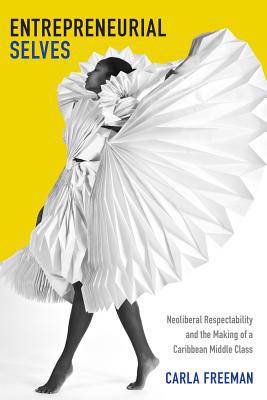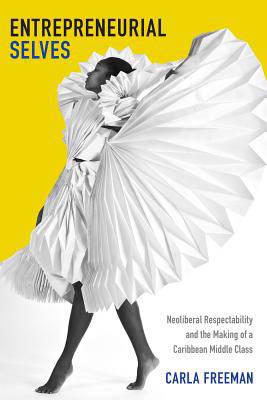
- Afhalen na 1 uur in een winkel met voorraad
- Gratis thuislevering in België vanaf € 30
- Ruim aanbod met 7 miljoen producten
- Afhalen na 1 uur in een winkel met voorraad
- Gratis thuislevering in België vanaf € 30
- Ruim aanbod met 7 miljoen producten
Zoeken
Entrepreneurial Selves
Neoliberal Respectability and the Making of a Caribbean Middle Class
Carla Freeman
€ 56,45
+ 112 punten
Uitvoering
Omschrijving
Entrepreneurial Selves is an ethnography of neoliberalism. Bridging political economy and affect studies, Carla Freeman turns a spotlight on the entrepreneur, a figure saluted across the globe as the very embodiment of neoliberalism. Steeped in more than a decade of ethnography on the emergent entrepreneurial middle class of Barbados, she finds dramatic reworkings of selfhood, intimacy, labor, and life amid the rumbling effects of political-economic restructuring. She shows us that the déjà vu of neoliberalism, the global hailing of entrepreneurial flexibility and its concomitant project of self-making, can only be grasped through the thickness of cultural specificity where its costs and pleasures are unevenly felt. Freeman theorizes postcolonial neoliberalism by reimagining the Caribbean cultural model of 'reputation-respectability.' This remarkable book will allow readers to see how the material social practices formerly associated with resistance to capitalism (reputation) are being mobilized in ways that sustain neoliberal precepts and, in so doing, re-map class, race, and gender through a new emotional economy.
Specificaties
Betrokkenen
- Auteur(s):
- Uitgeverij:
Inhoud
- Aantal bladzijden:
- 272
- Taal:
- Engels
- Reeks:
Eigenschappen
- Productcode (EAN):
- 9780822358039
- Verschijningsdatum:
- 3/12/2014
- Uitvoering:
- Paperback
- Formaat:
- Trade paperback (VS)
- Afmetingen:
- 89 mm x 262 mm
- Gewicht:
- 362 g

Alleen bij Standaard Boekhandel
+ 112 punten op je klantenkaart van Standaard Boekhandel
Beoordelingen
We publiceren alleen reviews die voldoen aan de voorwaarden voor reviews. Bekijk onze voorwaarden voor reviews.











